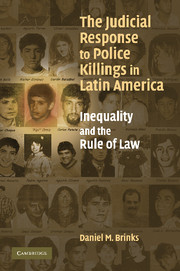Book contents
- Frontmatter
- Contents
- Preface
- 1 Effectiveness and Inequality in the Legal System
- 2 Charting Injustice in Argentina, Brazil, and Uruguay
- 3 Informational and Normative Shifts Across Jurisdictions
- 4 Buenos Aires – Political Interference and Informational Dependence
- 5 São Paulo – Normative Autonomy and Informational Failures
- 6 Uruguay – Strong Results from a Weak System
- 7 Córdoba – High Levels of Inequality in a Strong System
- 8 Salvador da Bahia – Social Cleansing Under Political and Judicial Indifference
- 9 Binding Leviathan
- Appendix: Methods, Case Selection, and Sampling
- References
- Index
1 - Effectiveness and Inequality in the Legal System
Published online by Cambridge University Press: 07 September 2009
- Frontmatter
- Contents
- Preface
- 1 Effectiveness and Inequality in the Legal System
- 2 Charting Injustice in Argentina, Brazil, and Uruguay
- 3 Informational and Normative Shifts Across Jurisdictions
- 4 Buenos Aires – Political Interference and Informational Dependence
- 5 São Paulo – Normative Autonomy and Informational Failures
- 6 Uruguay – Strong Results from a Weak System
- 7 Córdoba – High Levels of Inequality in a Strong System
- 8 Salvador da Bahia – Social Cleansing Under Political and Judicial Indifference
- 9 Binding Leviathan
- Appendix: Methods, Case Selection, and Sampling
- References
- Index
Summary
Injustice anywhere is a threat to justice everywhere. We are caught in an inescapable network of mutuality, tied in a single garment of destiny. Whatever affects one directly, affects all indirectly.
Martin Luther King, Jr., Letter from the Birmingham Jail (April 16, 1963)Ana lives in one of the vast poor suburbs of Buenos Aires. Her son was beaten to death after he allegedly punched a police officer. She says they were trying to teach him a lesson but things got out of hand. At least four policemen – and probably several more – locked him in a room and beat him with heavy sticks until they fractured his skull and he died. The policemen who killed him got promotions even after they were charged with the killing. At the trial, the prosecutor argued that they should be acquitted because they were just doing their job, subduing an unruly prisoner. The experts called by both the prosecution and the defense agreed.
As the law permits, Ana got some lawyers from an NGO to participate in the trial, as sort of private prosecutors. These lawyers work for free in cases like hers. They called their own witnesses and brought in experts, and argued that these policemen should not be set free after brutally beating an unarmed twenty-four year old and leaving him to die without medical attention. The NGO also organized demonstrations, bringing in many of Ana's neighbors to march in front of the courthouse throughout the trial.
- Type
- Chapter
- Information
- The Judicial Response to Police Killings in Latin AmericaInequality and the Rule of Law, pp. 1 - 36Publisher: Cambridge University PressPrint publication year: 2007



